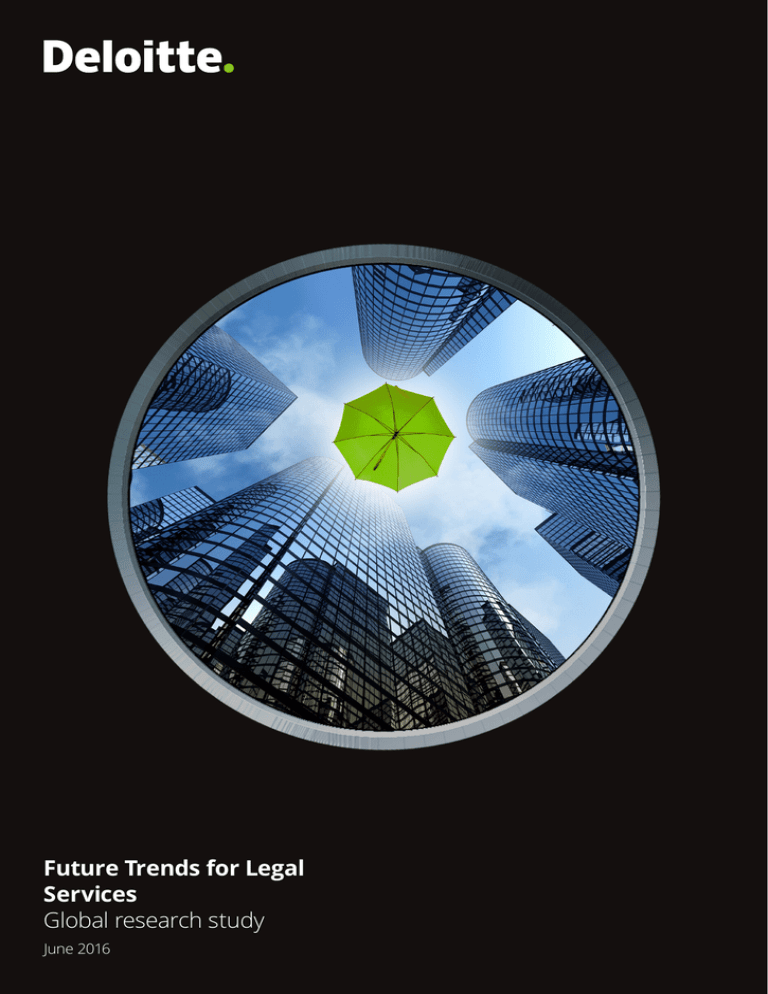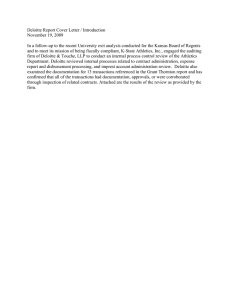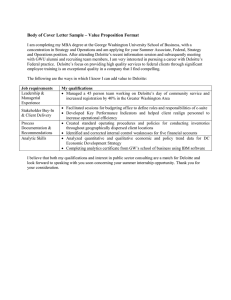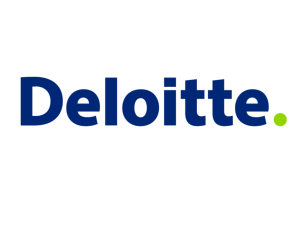Future Trends for Legal Services
advertisement

Future Trends for Legal Services Global research study June 2016 Future Trends for Legal Services The story in brief In a growing market, purchasing patterns for legal services are changing. In-house teams are looking for tech savvy, integrated service providers who offer more than traditional legal advice. Future Trends for Legal Services is an independent research study commissioned by Deloitte Legal. Findings are based on 243 quantitative survey responses, and 30 qualitative, in-depth interviews with in-house legal services purchasers, mainly occupying positions of CEOs, CFOs or General/Legal Counsel. The market is moving and growing Major purchasers of legal services are changing their approach to buying services across the globe. Overall, demand for legal services is growing. Every participant said that their legal spend was increasing in at least one area. Purchasing patterns are changing The majority of participants had recently taken or were considering a significant review of their legal suppliers. Many more were involved in an informal or on-going process of review. Purchasers’ expectations of legal services providers are evolving Expectations are not currently being met in a number of crucial areas. 1. Integrated, cross-border advice beyond legal. Law firms are seen to be trailing other professional services firms in their ability to offer integrated multidisciplinary services. 2. Use of technology. Participants are looking for better, more relevant technologies, to be used and shared on integrated platforms. 3. Regulatory and global compliance advice. Nearly half (49%) of all participants said that their department’s legal spend was growing in the area of regulatory compliance. Global compliance is perceived as a major issue for in-house lawyers. 4. Fixed fees, value pricing and greater transparency. Participants most frequently mentioned fixed or capped fees (30% of all responses), while over a quarter of responses (27%) referred to some form of value-based pricing. Demand for alternative or nontraditional legal service providers is increasing A majority of participants have or will significantly review their legal suppliers. More than half are willing to purchase legal services from a non-traditional law firm that offers a range of professional services. 2 Future Trends for Legal Services The legal services market is growing Overall, both demand and spend for legal services are growing. Particular areas are experiencing faster growth than others. Nearly half (49%) of all participants said that their department’s legal spend was growing in the area of regulatory compliance. Other growth areas include M&A (42%) and litigation (39%). Major areas where legal services spend is increasing 100% 80% 60% 49% 40% 42% 39% 20% 0% Areas of growth Regulatory compliance M&A Litigation 3 Future Trends for Legal Services Traditional law firms under scrutiny Conventional law firms are no longer meeting today’s business needs. The majority (55%) of participants in the study (legal counsel, general counsel – or CEOs and CFOs) have taken or are considering a significant review of their legal suppliers. Participants who have either recently reviewed their legal suppliers or will do so within the next 12 months 55% Participant responses Yes 4 Future Trends for Legal Services Challenges include global compliance & doing more with less Global compliance is perceived as a major issue for in-house lawyers, with over a quarter (26%) saying it is the biggest challenge within their department. Doing more with less, appropriate use of technology and the speed of business also are among the biggest challenges for in-house legal departments today. 44% 26% 17% 11% Biggest challenges faced in running or working in the corporate function Participant responses Doing more with less Global compliance The speed of business Using technology approppriately 5 Future Trends for Legal Services Use of technology is increasing The majority of participants said that technology had not replaced the tasks of in-house lawyers (77%) – yet. But over half (52%) said that this will happen over the next five years. Purchasers want better and more relevant technologies, to be used and shared on integrated platforms. Technology is used for in-house legal tasks today 18% 77% 5% Technology will be used for in-house legal tasks in the next five years 52% 28% 20% Participant responses Yes No Don't know 6 Future Trends for Legal Services Need for a new type of legal service provider One in three legal services purchasers surveyed want their legal services provider to bring industry, commercial and non-legal expertise, which currently they do not. They also want law firms to be more savvy on global data and cyber security protection issues and more pro-active in sharing knowledge across many jurisdictions. Traditional law firms are seen to be trailing other professional services firms in this area. Expertise desired by purchasers, but not currently delivered by major law firms Industry, commercial or non-legal expertise Digital, data privacy & cyber security Other More proactive knowledge sharing Regulatory & compliance More integration between legal practice areas Financial expertise 0% 5% 10% 15% 20% 25% 30% 35% 7 Future Trends for Legal Services Businesses are shifting purchasing patterns 52% of in-house legal departments are considering buying legal services from nontraditional law firms. Can you imagine a future where you would be happy to buy your legal services from a non-traditional law firm entity that provided a range of services? 52% 26% 22% Participant responses Yes No Don't know 8 Future Trends for Legal Services About this research Approach and timeframe Research consisted of 243 web-based surveys and 30 long-form qualitative interviews. Data was collected between September 2015 and February 2016. Participants profile Position: Participants had responsibility or influence in the purchasing of legal or any other professional services in their organisation, holding the position of General Counsel, Legal Counsel, CEO’s, CFO’s, or another executive management role. Organizations: Participants were from large multinationals and mid-sized companies present in five or more countries and operating in the consumer business, energy & resources, financial services, life sciences & healthcare, manufacturing, real estate, technology, and media and telecommunications industries. Company headquarters were split between the UK (27%), North America (25%), AsiaPacific (24%), Europe (excluding the UK) (21%), and Africa & the Middle East (3%). Geographies: Responses were received from participants located on 5 continents and in 33 countries. Participants were from developed and emerging markets. The largest group based on where the participant was located was Asia-Pacific (31%), followed by the UK (28%), North America (21%), Europe (excluding the UK) (17%) and Africa and the Middle-East (3%). 9 Deloitte refers to one or more of Deloitte Touche Tohmatsu Limited, a UK private company limited by guarantee (“DTTL”), its network of member firms, and their related entities. DTTL and each of its member firms are legally separate and independent entities. DTTL (also referred to as “Deloitte Global”) does not provide services to clients. Please see www.deloitte.nl/about for a more detailed description of DTTL and its member firms. Deloitte Legal means the legal practices of Deloitte Touche Tohmatsu Limited member firms or their affiliates that provide legal services. For legal and regulatory reasons not all member firms provide legal services. Deloitte provides audit, consulting, financial advisory, risk management, tax and related services to public and private clients spanning multiple industries. Deloitte serves four out of five Fortune Global 500® companies through a globally connected network of member firms in more than 150 countries bringing world-class capabilities, insights, and high-quality service to address clients’ most complex business challenges. To learn more about how Deloitte’s approximately 225,000 professionals make an impact that matters, please connect with us on Facebook, LinkedIn, or Twitter. This communication contains general information only, and none of Deloitte Touche Tohmatsu Limited, its member firms, or their related entities (collectively, the “Deloitte Network”) is, by means of this communication, rendering professional advice or services. Before making any decision or taking any action that may affect your finances or your business, you should consult a qualified professional adviser. No entity in the Deloitte Network shall be responsible for any loss whatsoever sustained by any person who relies on this communication. © 2016. For information, contact Deloitte Touche Tohmatsu Limited.






